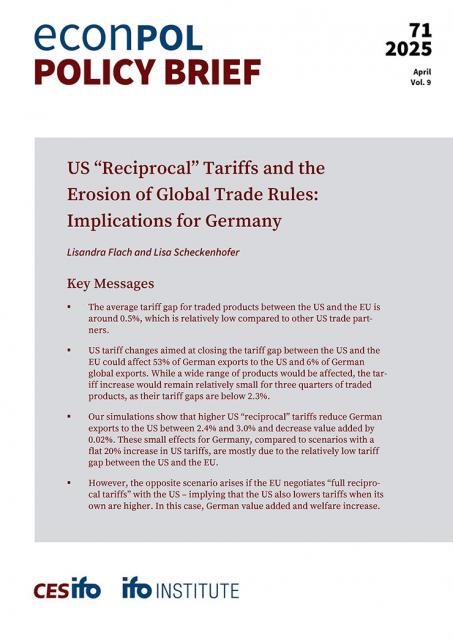News Archive

Population Aging and Cross-Country Redistribution in Integrated Capital Markets
|
EconPol Working Paper
| News
How can the European Union tackle its aging populations? Network member Thomas Davoine, IHS, investigates international spillovers due to capital market integration when populations age and the cross-country redistribution that this generates. Using a multi-country overlapping-generations model, he finds that labour supply drops more in rapidly aging countries, pushing up the capital-labour ratio, lowering returns on investment and generating capital flows towards countries with younger populations. The author looks at how governments can reform tax and pension policy to influence redistribution patterns and how rapidly aging countries can promote immigration to mitigate the negative redistributive effects of capital market integration.
... Details

Joint IES-VUB and EconPol Policy Forum on Future Perspectives for the EMU Brussels
|
Event
| News
The future of the European Economic and Monetary Union (EMU) is at the core of the reflection on the future of European integration. The debate about its architecture has accompanied the entire evolution of the EU and several proposals have been made in the past. This policy forum aims at an open, broad and deep discussion on the possible options for the future of the EMU, starting from the assessment of the existing proposals. We will try to investigate the economic, social and political implications of the EMU, to envisage the changes which may be necessary to move forward, and to assess the political feasibility.
... Details

Global Implications of U.S. Tax Reform
|
EconPol Working Paper
| News
What will be the impact of the latest US tax reform adopted on 1 January 2018? In this EconPol Working Paper Jack Mintz, President’s Fellow, School of Public Policy, University of Calgary, looks at the key features of the US Tax Cuts and Jobs Act, assesses its implications for global growth and speculates on how other countries are likely to respond to this ground-breaking reform.
... Details

EU Budget Reforms: Where Can Europe Really Add Value?
|
EconPol Policy Brief
| News
The debate over the next EU budget is already heating up. In early May the European Commission will publish its proposal for the Multiannual Financial Framework (MFF) for the years 2021-2027. Agricultural subsidies and regional transfers are likely to continue to swallow a large share of the EU budget. In view of the acute legitimacy crisis facing the EU, this spending structure calls for reform. The Commission has recommended using “European added value” (EAV) as a reform criterion. This policy brief considers whether allocating competences more effectively between the EU and its member states could boost the EU’s performance.
... Details

Addressing the Core-Periphery Imbalances in Europe
|
EconPol Working Paper
| News
How can the euro area tackle its perennial problems of core/periphery imbalances and anaemic long-term growth? According to network members Luigi Bonatti and Andrea Fracasso, Università di Trento, there is no quick-fix solution. Temporary fiscal stimulus does not produce permanent improvements, while the upfront costs and short-term negative impact of structural reforms can feed distributional conflicts. Permanent cross-national transfers provide local relief, but also exacerbate tensions among member states.
... Details
